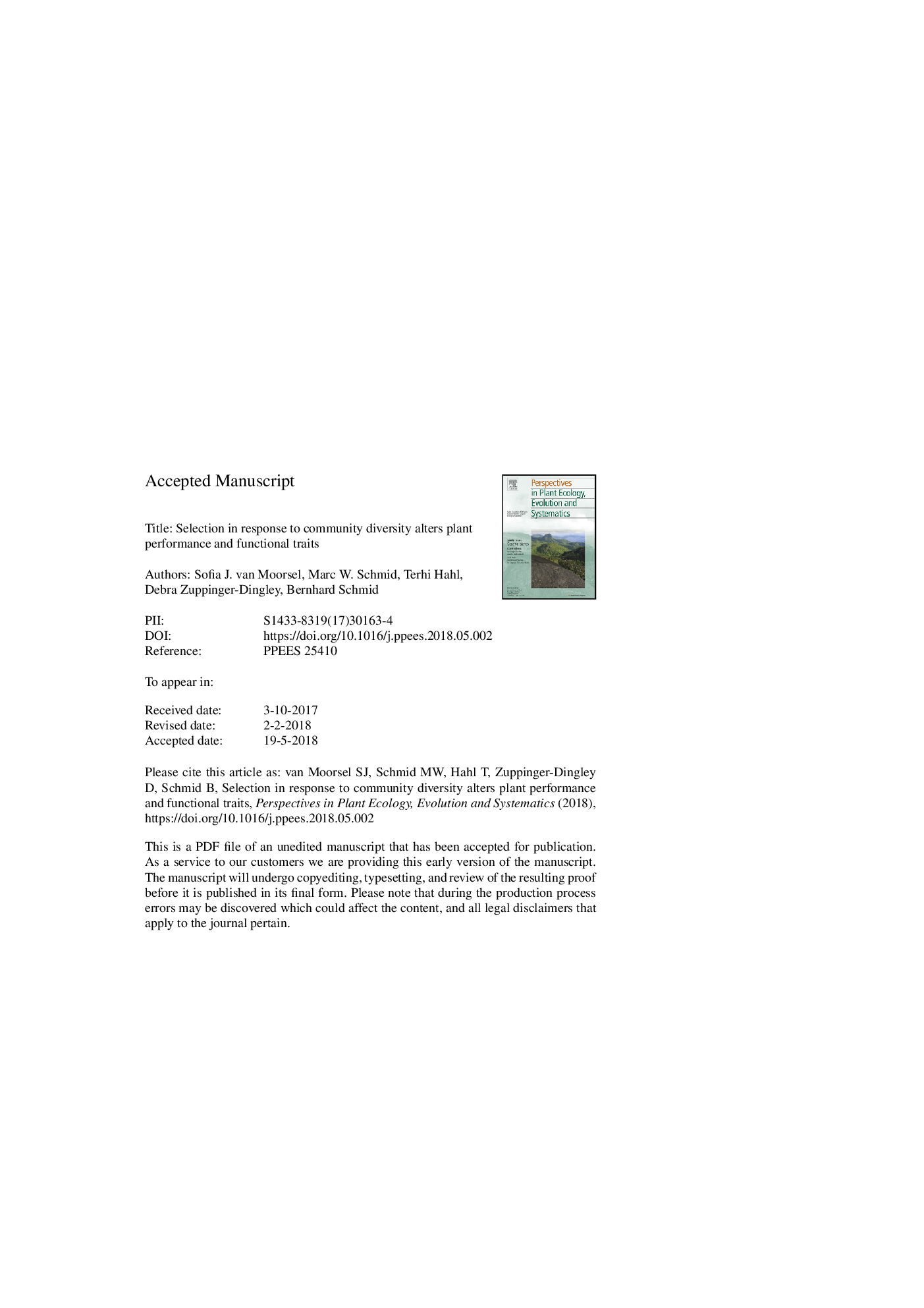| کد مقاله | کد نشریه | سال انتشار | مقاله انگلیسی | نسخه تمام متن |
|---|---|---|---|---|
| 8849491 | 1618587 | 2018 | 50 صفحه PDF | دانلود رایگان |
عنوان انگلیسی مقاله ISI
Selection in response to community diversity alters plant performance and functional traits
ترجمه فارسی عنوان
انتخاب در پاسخ به تنوع جامعه تغییر عملکرد کارخانه و صفات کاربردی
دانلود مقاله + سفارش ترجمه
دانلود مقاله ISI انگلیسی
رایگان برای ایرانیان
کلمات کلیدی
اثرات تنوع زیستی، چمنزار بهره وری کارخانه، انتخاب، تنوع صفات،
ترجمه چکیده
در آزمایش های تنوع زیستی علف های هرز، رابطه مثبت تنوع زیستی مثبت اکوسیستم در طول زمان به طور کلی افزایش می یابد. با این حال، ما کمی در مورد فرآیندهای تکاملی کوتاه مدت شناخته شده است. با استفاده از پنج گونه گیاهی که برای دوازده سال انتخاب شده در آزمایش تنوع زیستی در مخلوط یا تک کشت و گیاهان بدون چنین تاریخی انتخاب شد، ما بررسی کردیم که آیا انتخاب دیفرانسیل، بهره وری، اثرات تنوع زیستی و تفاوت ویژگی های عملکردی درون مونوکوکلورهای تازه و مشتق شده از 2 گونه را تغییر داده است. گیاهان بدون تاریخچه تاریخچه انتخاب جامعه گذشته در آزمایش تنوع زیستی کمترین مقدار زیست توده جمع آوری شده را نشان دادند و ضعف ترین اثرات تنوع زیستی را نشان دادند. در مخلوط تازه جمع آوری شده، گیاهان با تاریخچه انتخابی در مخلوط ها، بیشترین میزان زیست توده را از گیاهان با تاریخچه انتخاب تک نژاد تولید می کنند. اثرات تنوع زیستی به طور کلی مثبت بود و در میان تاریخ های انتخاب متفاوت بود. با این حال، بر خلاف انتظارات ما، اثرات تنوع زیستی برای گیاهان مخلوط قوی نبود. اثرات تنوع زیستی تحت تأثیر هر دو تفاوت صفات گیاهان و معیارهای جامعه قرار گرفت، اما این روابط بیشتر مستقل از تاریخ انتخاب بود. یافته های ما نشان می دهد که دوازده سال سابقه انتخاب در گیاهان یکپارچه یا گونه های مختلف گیاهان هر یک از گونه ها را به گونه های تک کشت و مخلوط تقسیم می کنند. چنین تحول سریع گونه های مختلف جامعه در بین گونه های علف های هرز و تأثیر آن بر خدمات و عملکرد اکوسیستم، به احتمال زیاد در حفاظت از گونه ها مهم خواهد بود.
موضوعات مرتبط
علوم زیستی و بیوفناوری
علوم کشاورزی و بیولوژیک
بوم شناسی، تکامل، رفتار و سامانه شناسی
چکیده انگلیسی
In grassland biodiversity experiments the positive biodiversity-ecosystem functioning relationship generally increases over time. However, we know little about the underlying short-term evolutionary processes. Using five plant species selected for twelve years in a biodiversity experiment in mixture or monoculture and plants without such a selection history, we assessed whether differential selection altered productivity, biodiversity effects, and functional trait differences within newly assembled monocultures and 2-species mixtures. Plants without a past community selection history in the biodiversity experiment produced the lowest assemblage biomass and showed the weakest biodiversity effects. In newly assembled mixtures, plants with a selection history in mixtures produced more biomass than plants with a monoculture selection history. Biodiversity effects were generally positive and differed significantly between selection histories. However, contrary to our expectations, biodiversity effects were not stronger for mixture-type plants. Biodiversity effects were influenced by both trait differences between plants and community-weighted means, but these relationships were mostly independent of selection history. Our findings suggest that twelve years of selection history in monocultures or species mixtures differentiated plants of each species into monoculture- and mixture-types. Such rapid evolution of different community-types within grassland species and its effect on ecosystem services and functioning are likely to be important for species conservation practice.
ناشر
Database: Elsevier - ScienceDirect (ساینس دایرکت)
Journal: Perspectives in Plant Ecology, Evolution and Systematics - Volume 33, August 2018, Pages 51-61
Journal: Perspectives in Plant Ecology, Evolution and Systematics - Volume 33, August 2018, Pages 51-61
نویسندگان
Sofia J. van Moorsel, Marc W. Schmid, Terhi Hahl, Debra Zuppinger-Dingley, Bernhard Schmid,
